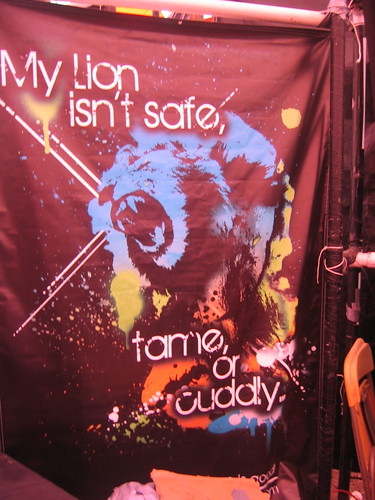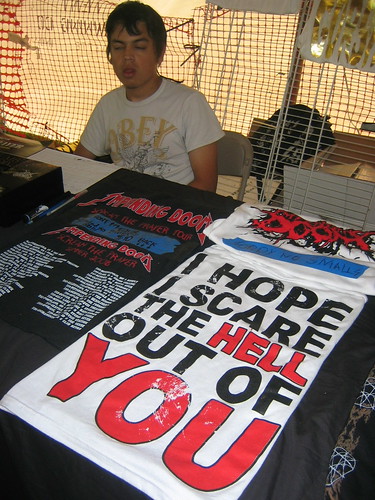My commitment to saving gas is so pathetic as to be comical — I mean, a fair-weather cyclist who works from home is hardly capable of a real sacrifice in fossil-fuel consumption — but I’m trying to approach it with some level of seriousness. And I’ve set a goal: The one-month tank of gas. Fourteen gallons in 30 days.
It’s not that far-fetched. I made it to three weeks between fill-ups recently without making myself a hermit in the bargain. If you can go three weeks, you should be able to go four, right? Here are my main rules and strategies:
1) Combining trips. If I’m going to Royal Oak for a meeting, I try to think of other stuff I can do while I’m out there. I mean, besides eat lunch. If the trip takes me past Costco (and most do), I make a stock-up stop.
2) Telling my dear only child, “Can’t you ride your bike? Lansing’s not that far. ”
3) It’s difficult to shop for a week of groceries on a bicycle, but easy to get a day’s worth. I pretend I’m French and live in a tiny Paris walkup with a refrigerator the size of a shoebox.
4) All shopping excursions requiring the car get a second, third or fourth look. All chances to interact with other human beings I don’t even question. The idea is to save gas, not become a crazy miserly energy tyrant.
5) You can fit more on the back of a bike than you think, if you have the right bungee cords. It does make the thing a little light up front, however. And carrying home certain loads — a few bottles of wine, a big bag of dog food — make you look like a crazy person who lost her driver’s license to multiple drunk-driving convictions. But it’s fun to be crazy. At least people get the hell out of your way.
6) Finally — and this is huge in Detroit — I started driving the speed limit. There’s an essay in that, because absolutely nobody in this town, in the state, does so. The default driving style is fast, cheap and out of control, and while it can be fun, it doesn’t exactly make the real-time mileage gauge on the dash track a nice steady number. Driving the speed limit in Detroit is like being an atheist in Colorado Springs. People not only look at you funny, they think you’re with al-Qaeda.
If none of these strategies seem particularly earth-shattering, well, you lived through the ’70s, too. It’s hard to make you younger folks understand how unsettling that era was, and prices aside, it was unsettling. Stations closed at 5 p.m. Some areas restricted sales to every other day depending on last name or plate number. Lines at the pumps stretched a block or more. And it happened so fast — one day gasoline was an expense for most households the way coffee was an expense, and suddenly it turned into a mortgage. I drove to Cleveland with some friends for a day trip during this period, and we delayed topping off the tank. As we turned for home, we entered a strip of gas stations near the freeway entrance, and justlikethat, they all turned off their lights and closed for business, and it was like that all over town. We had to spend the night, like pioneers stranded by a blizzard.
For teenagers accustomed to getting a couple days’ driving out of a dollar’s worth of gas, it was shocking.
A few years later came the big coal strike that led to voluntary restrictions on electricity use, deep into one of the coldest winters on record, and certainly in my lifetime. I think of that era as cold, dark and expensive, and it changed my energy-use behavior forever. I’ve never bought a car without at least considering its gas mileage. I never set the thermostat above 68. I watch my tach as closely as I watch my speed, and shift to minimize RPMs whenever possible.
This sort of era can turn you crabbed and mean; the dark side of thrift is miserliness, a refusal to share in any sort of bounty for fear of a coming shortage. But I’m sympathetic to those caught flat-footed. Many of my neighbors are in the automotive business, and many drive enormous, hulking, high-profit-margin vehicles that are surely running them to the poorhouse, one tank at a time. (Remember, this is the industry that, when confronted with the early Honda subcompacts, offered as competition the Chevy Vega and Ford Pinto.) Many are younger than I am, and don’t remember the fun old days. Ah, well. As my parents responded to my whining then with stern reminders of the deprivations of the war years, so too do I nod in sympathy, as I roll past on pedal power.
How do you save gas without being totally anal about it?
By the way, today I’m having lunch on the patio at the Detroit Golf Club — a planning session for our movie challenge entry, next month. See Rule #4, above. I’m so starved for a non-family human interaction I’d drive to Ypsilanti for donuts with Mitt Romney. (Downside: Again, it’s not even 50 degrees yet. Maybe they’ll have to serve us our coffee in thermal casks.)
A bit o’ bloggage:
In addition to the big essay on conservatism, I also read this in the New Yorker this weekend, about Katie Couric’s travails as anchor of the CBS Evening News. I read it with the same sense of awe I have whenever I think about the evening network news — that somewhere in this country there are still people with nothing better to do at 6:30 p.m. than watch 22 minutes of old-skool network news. So, I think, does Nancy Franklin, who wrote the piece:
The evening news continues to have value for millions of people, but millions more are now turning to the Internet. Increasingly, and in more ways than one, there is an end-of-the-day feeling to the nightly-news half hour—there’s ad after ad for products that treat all the things that go wrong with your body after you’re fifty, and in the broadcast itself there’s the endless use of the tired phrase “pain at the pump,” for stories on fuel prices, and always, in stories about pharmaceutical companies or warnings about drugs, the same shot of pills moving rapidly along a conveyor belt.
Our witty pal Alex once described the overarching theme of network news as “somewhere, someone younger than you is spending your tax dollars on things you wouldn’t approve of,” and that’s word, too. Later:
But I don’t think that people want less news; they want, I believe, the same kind of informed passion and doggedness that TV-news people displayed while covering Hurricane Katrina, and they want anchors to go deep into issues. Who knows, young people might turn on their TVs in droves if news organizations had a few choice strands of Michael Moore’s DNA in them, and pointed out when, say, a public official wasn’t telling the truth. Jon Stewart is a lightning rod both for people who decry the notion that young people get their news from watching “The Daily Show,” and for people who think that his (and Stephen Colbert’s “The Colbert Report”) is the only current-events show worth watching. I’m not a Stewartite, but when Dick Cheney denies making certain statements about the war in Iraq and Stewart shows three video clips that prove he’s lying, I think he’s providing a real service to the country, and I’d like to think that that’s what his fans are responding to.
That’s exactly right. I’m late to the Jon Stewart fan club, and I certainly wouldn’t want to see him on a network newscast — it would ruin his magic — but I’d drive an SUV to Ypsi to see him do an author interview before I would, say, Brian Williams. (His dissection of Jonah Goldberg is a minor classic.) Stewart brings a level of honesty to the table that so-called professional journalists either can’t or won’t, because they interpret “objectivity” so strictly that they can’t call a spade a spade. Haven’t they figured out that the people they cover are wise to this? How many books does Scott McClellan have to write before it gets through: Sometimes the people behind the podium? Are LYING. It’s not bias to point this out. It’s, um, journalism.
Well, don’t want to start ranting.
Why newspapers are dying: Because they think there’s no room for ALL the “Sex and the City” movie-premiere fashion pictures. But Jezebel does.
The morning, she is slipping away. Better go select my long underwear for visiting the golf club on the 28th DAY OF DAMN MAY, FOR GOD’S SAKE. Have a good one.




